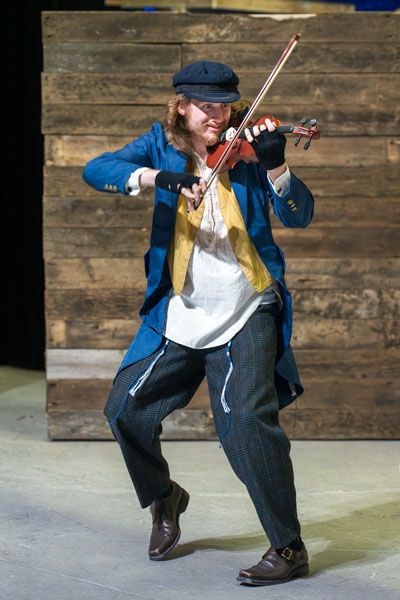Letter to Readers: ‘Fiddler on the Roof’ provides timeless themes, great melodies

Tevye, to God: “I know, I know: we are the chosen people. But once in a while, can’t you choose someone else?”
The ironic humor in lines such as this from “Fiddler on the Roof” imbue the musical, which opens this weekend and runs through March 7 at Gallery Theater in McMinnville.
This show is always worth seeing; it’s funny, touching, and thought-provoking — by turns scary in an imaginary and comic way and, later, in an all-too realistic manner. The title fiddler on the roof is allegorical for the joyful precariousness of existence.
As a night of entertainment, consider that the experienced Seth Renne is directing the show, and the cast is filled with Gallery veterans, notably Lance Nuttman in the iconic role of Tevye the Dairyman. Gallery shows tend to sell out, so anyone wishing to order tickets should do so soon at gallerytheater.org
The music is by Jerry Bock, lyrics by Sheldon Harnick, and book by Joseph Stein; and the story set in the set in the Pale of Settlement of Imperial Russia — places where Jews were forced to live — in or around 1905. Pain and change are everywhere.
Its themes are particularly resonant these days, as we hear of increased reports of antisemitism around the country, including vandalism this week to a Jewish community center in Portland. Someone damaged its mezuzah, a sacred object affixed to the doorway and containing verses from the Torah.
The show has deep meaning to me, personally: we had a turntable growing up and the soundtrack, featuring Zero Mostel, was one we often played, and I recall in a visit to Chicago in 1968 my mother and her sister going to a post-Broadway production of the musical. I kind of grew up with the music, and was exposed to more of its source lore as a young adult, years later.
In a visit to Jerusalem in 1984 some visiting American friends treated me to a one-man show of the stories of Sholem Aleichem, the Russian writer whose tales of the village of Anatevka form the basis of the script. The minimalist, purely oral, recitation of the travails of Tevye and other villagers made for powerful evening of theater. My friends were Jewish; I am not, but having twice lived in Israel among Jewish people, I developed a kind of foundational “goyishe” understanding of what Jews have dealt with for years. I don’t know where that sensibility would be without the works of Aleichem, who wrote a dramatic adaptation of the stories that he left unfinished at his death in 1919.
This is a story of a family, a poor and loving one, that happens to be Jewish. It is the story of a man agonizing over his faith and his lot in life, and the heavy weight of tradition. It is a story of how people care about their family members, and their community, and respond to rapid and sometimes grave changes in their lives.
A signature song (among many) is “Tradition,” which sets the stage for the conflicts to come: daughters marrying and departing, and tyranny raising an increasingly harsh hand. Tevye might as well be singing “Transition! Transition!”
The play has had its critics — Philip Roth called it “shtetl kitsch,” but writer Alisa Solomon described it as “one of the first popular post-Holocaust depictions of the vanished world of Eastern European Jewry.”
For that reason it needs to be seen, and for other, timeless and tragic themes: the persecution of Jewish people well-predated the Holocaust and it was an institutionalized repression, a reminder of what can happen when those in power decide to discriminate against entire groups of people.
Kirby Neumann-Rea
Managing Editor
kirby@newsregister.com
503-687-1291












Comments